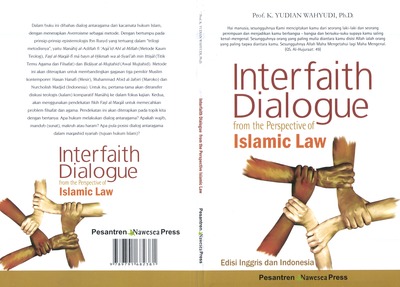Wahyudi, Yudian (2016) Interfaith Dialogue from the Perspective of Islamic Law. Buku, Vol. 1 (No. 1). Pesantren Nawesea, Yogyakarta. ISBN 978-979-16823-8-1
![[img]](https://digilib.uin-suka.ac.id/24252/1.hassmallThumbnailVersion/Cover%20-%20Interfaith%20Dialogue%20from%20the%20Perspektive%20of%20Islamic%20Law.png)
|
Image (Interfaith Dialogue from the Perspective of Islamic Law)
Cover - Interfaith Dialogue from the Perspektive of Islamic Law.png - Cover Image Download (6MB) | Preview |
|
|
Archive (Interfaith Dialogue from the Perspective of Islamic Law)
Yudian Wahyudi - Interfaith Dialogue from the Perspektive of Islamic Law.pdf - Other Restricted to Registered users only Download (537MB) |
Abstract
Interfaith dialogue is and always has been an integral part of Islam, but it has taken on increased importance since the September 11 tragedy. Most scholarship on the subject, however, looks at it from a historical rather than a theoretical point of view, or if it treats theory at all, it concentrates on enumerating shared values. Seldom, if ever, are the writings of Muslim scholars or intellectuals explored for insight into how Islam justifies interreligious discourse. In order to fill this lacuna, I propose to look at the legal basis for interfaith dialogue in Islam, and to do so I apply Averroism as a method, relying on the epistemological principles outlined in Ibn Rushd' s "methodological trilogy": his Manah.ij al-AdiUah jT 'A1a'id Ahl al-Millah, Fasl al-Maqal fi ma bayn al-l-Hikmah wa al-Shari'ah min al-ittisal and Bidayat al-Mujtahid fi Nihayat al-Muqtasid. This method will be applied to the ideas of three representative Muslim scholars of the modern day: the Egyptian Hasan Hanafi, the Moroccan Muhammad 'Abid alJabiri and the Indonesian Nurcholish Madjid. To do so I will first of all transfer the Manahij's comparative theological (kalam) discussion to my current focus. Secondly, I will take fasl al-Maqal' s legal (fiqh) approach to solving the problem of philosophy and religion, and apply it to the current topic by asking: What is the legal status of undertaking interfaith dialogue? Is it obligatory (wajib), recommended (mandUb), indifferent (mubCih)), detested (makruh) or prohibited (h)aram)? And what is the position of interfaith dialogue in the Maqasid al-Shari'a (the aims of Islamic law)? Although I will compare Madjid's, al-Jabiri's and Hanafi's points of view from a legal perspective, lwill not give my personal judgements on whose opinions are right or wrong, stronger or weaker, as Ibn Rushd did in his Bidayat al-Mujtahid.
| Item Type: | Book |
|---|---|
| Uncontrolled Keywords: | Interfaith Dialogue, Islamic Law, dialog antar agama, hukum Islam |
| Subjects: | Perbandingan Agama |
| Divisions: | Buku |
| Depositing User: | Sugeng Hariyanto, SIP (sugeng.hariyanto@uin-suka.ac.id) |
| Date Deposited: | 14 Mar 2017 10:05 |
| Last Modified: | 18 Aug 2020 12:48 |
| URI: | http://digilib.uin-suka.ac.id/id/eprint/24252 |
Share this knowledge with your friends :
Actions (login required)
 |
View Item |


